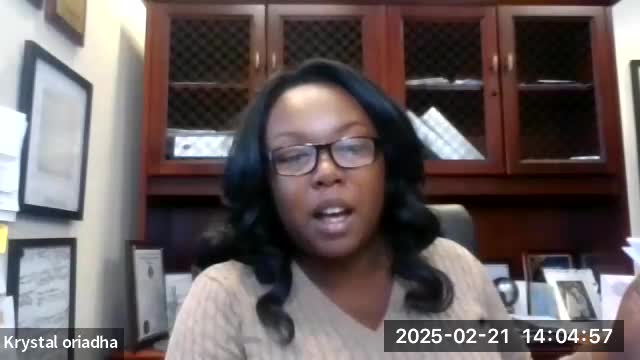Prince George's County work group advances recommendations for LGBTQ+ youth services
Get AI-powered insights, summaries, and transcripts
Subscribe
Summary
Prince George's County LGBTQIA Work Group discussed a package of recommendations to expand emergency shelter, mobile health, peer support, legal aid, job training, vouchers and community centers for LGBTQ+ youth and young adults. Staff were directed to follow up on several feasibility questions and outreach tasks.
Prince George's County Councilwoman Crystal Reza, co-chair of the county’s LGBTQIA Work Group, led a Feb. 4 meeting that reviewed a set of recommendations aimed at expanding services for LGBTQ+ youth and young adults, including emergency shelter options, mobile health clinics, peer-support groups, legal aid, job training, housing vouchers and community centers.
The work group’s stated goal is to develop recommendations for the County Council and the county executive on policy, procedure and resource changes to address high-priority needs in the LGBTQ+ community. Members discussed short- and long-term options and asked staff to research feasibility and partners for several proposals.
Work group members prioritized emergency shelter and short-term housing models, noting a gap in county-specific programs. Reza described one model seen in Washington, D.C., and a “host home” approach used for young adults who have aged out of foster care. "The shelters will provide safe, affirming spaces where individuals can stay for up to 6 months," Reza said, describing the time-limited shelter concept. Participants discussed costs tied to facility set-up, staffing, utilities or hotel/lease arrangements and asked staff to identify local organizations that could partner on shelter options.
Public-health interventions were next. The group discussed expanding mobile health clinics to deliver HIV and AIDS testing, counseling and basic care in underserved areas. Reza said a local organization, Heart to Hand, already operates a mobile testing unit in the county and suggested funding or expanding its services. Reza asked staff to confirm whether on-site screening and enrollment for PrEP and PEP is available through those mobile units and directed follow-up with the organization.
Mental-health and peer-support proposals centered on establishing peer-led groups for LGBTQ+ youth and young adults to address isolation, stigma and coping strategies. The work group discussed low-cost models that rely on volunteer facilitators and donated space, with options to include licensed professionals for some sessions. Reza asked staff to survey neighboring jurisdictions, such as Washington, D.C., and Montgomery County, for models the group could adopt or adapt.
On legal services, the group recommended creating free or low-cost legal-aid clinics to assist LGBTQ+ residents facing discrimination in housing, employment or health care. Reza suggested outreach to Maryland Legal Aid to determine whether the organization has staff with expertise in LGBTQ+ discrimination or would need resources to provide a specialized service.
For economic stability, members discussed job-training initiatives that would partner with Employ Prince George’s to create programs for LGBTQ+ participants and affirming employers. Elena, an agency representative who said her organization contracts with Employ Prince George’s, called such a partnership feasible and recommended starting with a small pilot cohort.
Housing recommendations included a long-term voucher program and developer set-aside units for youth aging out of foster care. Reza noted a county initiative to encourage developers to reserve small numbers of units in new projects and asked staff to confirm the county’s current voucher intake status; she said she believed the voucher program had been closed to new applicants for several years and asked staff to verify that.
The group also discussed cultural-competency training for government and nonprofit service providers and making some trainings mandatory rather than optional. A staff representative said the Office of Human Resources Management offers courses and noted that some training—for example, harassment prevention—is mandatory while cultural-competency offerings may be optional; staff were assigned to inventory mandatory versus voluntary trainings.
Long-term proposals included establishing community centers modeled after existing local organizations such as Us Helping Us and piloting programming through library or community-center partnerships while permanent sites are developed. Members suggested rotating or monthly programming to increase geographic access across the county.
The work group assigned several follow-up tasks to staff: confirm whether the county’s housing voucher program is accepting new applicants; contact Maryland Legal Aid about specialized legal support for LGBTQ+ discrimination cases; verify whether Heart to Hand’s mobile unit can complete PrEP/PEP enrollment or only refer; request inventory of mandatory versus optional cultural-competency trainings from human resources; and check with the Department of Social Services about therapeutic foster-care capacity and whether a pilot for LGBTQ+ youth placement is feasible. The group also invited suggestions for outside presenters to appear at future meetings.
No formal votes or motions were recorded at the meeting. The work group scheduled its next meeting for March 21.
